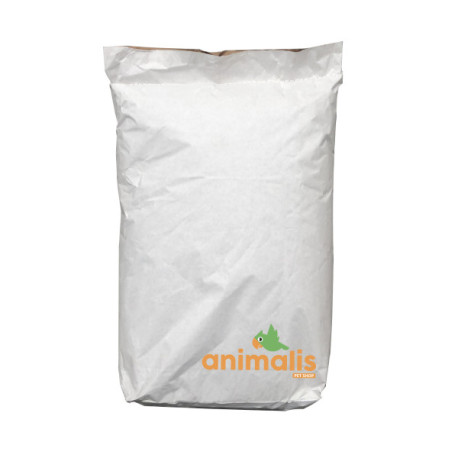- In the process of being restocked






Reference: 103042250
Clover stimulates the immune system and slows down cellular ageing through its excellent antioxidant properties. Rich in vitamins B, C, E and provitamin A.
Radish seeds have antioxidant, detoxifying, draining, and decongestant properties.
Yellow millet is rich in vitamins and minerals and is an alkaline (non-acidic) cereal. It is part of the basic diet of parakeets, exotic birds and exotic doves.
Millet contains magnesium, phosphorus, iron, potassium, manganese, vitamin A, vitamin B1, vitamin B2, vitamin PP (nicotinic acid) and vitamin B5.
Peeled peanuts are treats highly appreciated by parrots.
They should be distributed sparingly as they are rich.
An ideal food to fill your feeders for wild birds, they will provide the necessary fat for birds to get through the winter more easily.
A favourite of tits and a real delicacy for many birds.
Spinach seeds contain vitamins A, B1, B2, B3, B7, B9 and C, mineral salts and trace elements. Regular consumption helps to strengthen the feathers.
The evening primrose is an annual or biennial, rustic, which can be found naturally at the edge of paths near the Atlantic and Mediterranean coasts but also on the embankments of railways. Its erect stems are lined with large rosettes of downy leaves veined with red, between 10 and 30 cm long, oblong in shape, lanceolate, toothed, a little sticky.
Pine seeds are a good source of Phosphorus, Magnesium, Zinc, Manganese, Copper, Iron, Vitamin E, K, B1, B2, B3, B9.
Canary seed is a grass, an annual plant that can reach up to 1m in height, with seeds found in the inflorescences. These seeds make up a significant portion of most bird seed mixes.
• Excellent for canaries, European and exotic birds, budgerigars, and large parakeets.
• EXTRA canary seeds have undergone additional cleaning and are of exceptional quality. Unique on the market!
Striated sunflower is the basic seed of any parrot mixture. It is also used in mixtures for parakeets and exotic doves.
It is also the favorite food of your outdoor birds during the winter period! Ideal for feeding the birds in your garden.
Practical information for giving sunflower seeds to birds in your garden:
Remember to regularly clean the feeders of your outdoor birds so that diseases and bacteria do not thrive.
Also consider setting feeders high up to prevent predators (such as cats, foxes, etc.) from targeting birds when they are eating.
Foniopaddy Seed is a natural grass seed grown on our plantations in Uganda. Scientific research has shown that Foniopaddy has a beneficial effect on coccidiosis.
The canary seed is a grass, an annual plant up to 1m tall, the seeds being found in the inflorescences. These seeds represent a significant fraction of the majority of bird mixtures.
• Excellent for canaries, European and exotic birds, wavy parakeets and large parakeets.
• EXTRA canary seed has undergone extra cleaning and is of exceptional quality. Unique on the market!
Peeled oats 20kg
Prebiotic fibres are important for promoting a beneficial intestinal environment, maintaining good intestinal function, and minimising inflammation. Whole oats are a good source of protective compounds called polyphenols, which have antioxidant properties.
Oatmeal or peeled oats are used in the composition of the basic mixtures of canaries and hooked beaks especially during the breeding and feeding period.
Its protein level is quite low, but it is a seed rich in energy.
Crude protein: 13%
Fat: 8%
Carbohydrates: 68%
Phosphorus: 0.4%
Calcium: 0.09%
They have the property of binding to minerals such as calcium, iron and zinc and making them less bioavailable.

